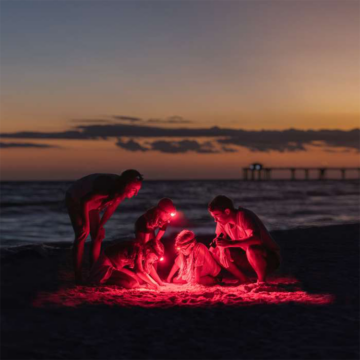International Dark Sky Week is a worldwide celebration to bring awareness to the harmful effects of light pollution. What is light pollution? Light pollution is the human-made alteration of outdoor light levels from those occurring naturally.
Why reduce the impact of light pollution? For one, do it for the turtles! During the summer, sea turtles come up onto our local beaches to lay their eggs. They typically do this in the middle of the night, when it’s dark, to avoid predators and disturbances. Artificial white lights, such as lamps, cell phone lights or even car lights, at night will deter sea turtles from nesting on our beaches.
Artificial light can even confuse the hatchling turtles. A couple of months after a female has nested, the eggs in the nest will hatch and baby hatchling sea turtles will emerge from the nest. This also typically happens at night because there are less predators and disturbances, but that’s not the only reason. Our sea turtles need a dark sky and moonlight to help guide them to the ocean! It is their instinct to follow the light to the water. If the beach is filled with artificial white lights, the hatchlings can disorient by following the lights towards land instead of out to the water
How you can help

One way to help protect our sea turtles from artificial white lights is to use a red light when on the beach at night! Sea turtles cannot see red light like you and I and are less impacted by it. You can get a FREE red sea turtle-friendly flashlight at the Destin-Fort Walton Beach Welcome Center on Okaloosa Island.
Sea turtles aren’t the only animals that dig the dark. Take our local Choctawhatchee Beach Mouse, for example! They are a nocturnal animal (active at night) and come out of their burrows during the night to forage. They are small and rarely seen, but boy are they cute! Some other examples of nocturnal animals are bats, raccoons, possums, and owls. All of these animals use the dark of the night for survival in some way.
We can also enjoy the night! Who likes to go stargazing? The best way to see the stars is to view them from a dark area away from any artificial lights. Who loves a good walk on the beach? Take a nice, moonlit stroll down the beaches of Destin-Fort Walton Beach and enjoy the sounds of the waves from the Gulf of Mexico.
How can you participate in International Dark Sky Week?
- Turn your lights off at night – this includes inside lights and those not even near the beach!
- Use a red flashlight on the beach at night when hunting for ghost crabs – help protect our sea turtles!
- Go stargazing and enjoy the natural dark beauty of mother nature!
Join us for Conservation Conversations this month and learn all about our local sea turtle conservation and research efforts! The event will be on Thursday, April 25th from 5:30-7:30 p.m. at The Island Resort.



